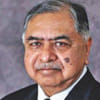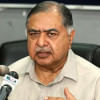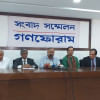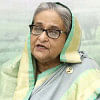The constitution: Reforms only after a strong consensus

"We must work together with the new generation, prioritise the aspirations of the people to build a democratic, just, and equitable Bangladesh."
Constitutional reforms should be done after taking people's opinions into account, said Dr Kamal Hossain, one of the framers of the constitution.
"No individual should change it [constitution] with the stroke of a pen," he said at a discussion yesterday.
"If a person, even if it is the president, feels that something is wrong, it would not be appropriate for them to change it single-handedly. They should proceed with amending the constitution only when a strong consensus or majority opinion has been established," Dr Kamal said.
Bangladesh Democratic Lawyers' Association organised the event to mark the day the constitution was adopted 52 years ago.
"We noticed that 15 to 16 amendments were made to the constitution. It was done from the realisation that it is made by human beings. The provision which was deemed right 10 years ago might create problems in a changed scenario. Then the constitution can be amended. But the people have to be taken on board to do that.
Dr Kamal, also the emeritus president of Gono Forum, said the reforms should be done with an aim to eliminate all forms of discrimination.
"We must work together with the new generation, prioritise the aspirations of the people to build a democratic, just, and equitable Bangladesh. Our commitment is to ensure a nation free from discrimination, where no one faces inequality based on gender, religion, ethnicity, political beliefs, or any other identity. All constitutional reforms must be made with this objective in mind."
He said people must remain vigilant about how the constitution is being interpreted, whether it is being interpreted correctly or misinterpreted.
The constitution is a document that is interpreted by people. Even the court interprets it, and the court can also make mistakes. The chief justice himself may err, he said.
Addressing the event, eminent jurist Shahdeen Malik criticised frequent changes in the form of the government.
"We formed 11 different types of governments in 52 years. Problems may arise in running a state, but the way we changed the form of the government is like changing a car because a tyre got punctured," he said.
Malik said it was a manifestation of the nation's immaturity regarding state operations.
"If we face any issue, we seek a solution only by changing the form of government. No one in the world does that, but it has become ingrained in us. And we think it is the only solution," he said.
Eminent historian Prof Syed Anwar Hossain said the current government has no right to amend the constitution since it was not elected. This government can only recommend amendments that have to be made by an elected government.
"There is no provision for an interim government in the constitution. We got an unelected government after ousting the autocratic regime."
The court validated the current government under the doctrine of necessity.
Prof Anwar alleged that although the supreme court is the custodian of the constitution, it failed to play its role. "The court followed the government's order and has been doing so."
He opined that prime ministers should not serve more than two terms.
Speaking at the programme, Supreme Court Bar Association President AM Mahbub Uddin Khokon said the debate over whether to amend the constitution or write a new one was dividing the nation.
"If any amendment is made or the constitution is rewritten, who will approve it? The last parliament? That's not possible. The future parliament? What if it does not approve it? So, it'll only widen the split," he said.
He also said a consensus should be reached through discussions with political parties that the amendments will be made when they are voted to power.
Among others, Bangladesh Democratic Lawyers' Association President Subrata Chowdhury, General Secretary Zahidul Bari, senior lawyer Mohiuddin Abdul Kader, and SMA Sabur spoke at the programme.

 For all latest news, follow The Daily Star's Google News channel.
For all latest news, follow The Daily Star's Google News channel. 







Comments